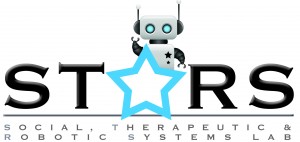 The Computing Community Consortium (CCC) is releasing its fourth segment in the Computing Research in Action Series. Researchers at Mississippi State University are studying human-robot interaction − how people respond to robotic technology. Professor Cindy Bethel started and oversees the Social Therapeutic and Robotic Systems (STARS) Lab. She leads a team of 22 researchers including undergraduates, masters, and PhD students.
The Computing Community Consortium (CCC) is releasing its fourth segment in the Computing Research in Action Series. Researchers at Mississippi State University are studying human-robot interaction − how people respond to robotic technology. Professor Cindy Bethel started and oversees the Social Therapeutic and Robotic Systems (STARS) Lab. She leads a team of 22 researchers including undergraduates, masters, and PhD students.
“This research has been an investment of heart and soul for our students and for me. We started out where we didn’t have any funding for this, but it was something that we were passionate about. And so we have devoted our time to this and to building this program.” – Cindy Bethel
Here’s a summary of several research areas in the STaRS Lab:
- The STARS Lab is working with the Starkville Police Department SWAT Team to investigate the uses of a remotely-operated robot and a robot that has supervised autonomy capabilities in coordination with a SWAT team. In addition to developing tactics for a robot, the lab is examining which robot features are most useful to a SWAT team. This project will save lives by helping law enforcement officers more safely handle the most dangerous situations. The Army Research Laboratories Human Research and Engineering Directorate funds this research. This is the work featured in the Computing Research in Action video.
- The Therabot team, funded by the National Science Foundation, is in the process of developing a robotic therapy support system. The goal is to provide a small robotic dog to people undergoing therapy, especially those with Post-Traumatic Stress Disorder (PTSD). The robot will be used by patients to perform therapy exercises at home, enhancing the therapy experience, and supporting less frequent supervised therapy sessions.
- The Interview team, funded by the National Science Foundation, investigates the use of robots as intermediaries for gathering sensitive information from children. Part of the project includes investigation of child eyewitness memory accounts and learning more about children’s experiences with bullying. This research explores whether there will be differences in the quantity and validity of information depending on whether the information is obtained from a human interviewer, robot interviewer, or a paper survey.
For more information on the STARS Lab, please visit their website.
The CCC is still accepting submissions for the Computing Research in Action series. Selected projects will receive a $1,500 travel award for a research team member to present the featured project at a conference. We encourage you to submit your research project for consideration by filling out this short entry form. If you have any questions about our series, please don’t hesitate to reach out to Helen Vasaly, CCC Program Associate.









